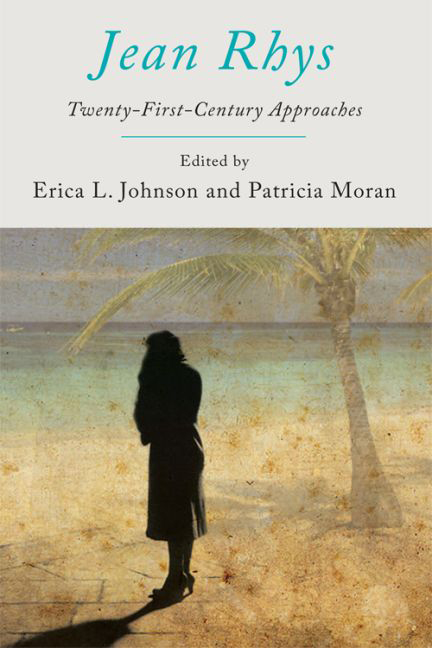Book contents
- Frontmatter
- Contents
- List of Figures
- Acknowledgements
- Notes on Contributors
- Introduction: The Haunting of Jean Rhys
- PART I Rhys and Modernist Aesthetics
- PART II Postcolonial Rhys
- PART III Affective Rhys
- 8 The Empire of Affect: Reading Rhys after Postcolonial Theory
- 9 ‘The feelings are always mine’: Chronic Shame and Humiliated Rage in Jean Rhys's Fiction
- 10 ‘Upholstered Ghosts’: Jean Rhys's Posthuman Imaginary
- Bibliography
- Index
8 - The Empire of Affect: Reading Rhys after Postcolonial Theory
from PART III - Affective Rhys
Published online by Cambridge University Press: 12 September 2017
- Frontmatter
- Contents
- List of Figures
- Acknowledgements
- Notes on Contributors
- Introduction: The Haunting of Jean Rhys
- PART I Rhys and Modernist Aesthetics
- PART II Postcolonial Rhys
- PART III Affective Rhys
- 8 The Empire of Affect: Reading Rhys after Postcolonial Theory
- 9 ‘The feelings are always mine’: Chronic Shame and Humiliated Rage in Jean Rhys's Fiction
- 10 ‘Upholstered Ghosts’: Jean Rhys's Posthuman Imaginary
- Bibliography
- Index
Summary
The canonical status Wide Sargasso Sea (1966) acquired within postcolonial literary studies has shaped readings of not only the novel but also the entire corpus of Jean Rhys's work. In giving voice to the mad Creole Bertha Mason of Charlotte Brontë's Jane Eyre (1847), Wide Sargasso Sea emblematises social and political concerns that became central to postcolonial theory in the 1980s. Rhys's critical rewriting of Brontë's novel provided a key example of how the ‘Empire writes back’ to the imperial centres of Europe, to use Salman Rushdie's phrase: challenging Eurocentric histories of progress and civilisation by presenting images of the dehumanising effects of European colonialism. An enormous body of scholarship on Wide Sargasso Sea has emerged along these lines, eclipsing the scholarly output on Rhys's four earlier novels and short stories.
Transformations in postcolonial studies over the past decade offer the opportunity to rethink Wide Sargasso Sea and its relationship to Rhys's other work. The shift away from the centre-periphery model of postcolonial theory toward more multilateral, multinational analyses of globalisation among theorists of postcolonialism opens up possibilities for more nuanced readings of a writer who never fit terribly well within the categories of modernist, feminist, or postcolonial authorship. From her earliest writings, Rhys explored the victimisation of women within a patriarchal and capitalist system, one that placed racialised Others in situations of particular vulnerability. Yet her writings also demonstrate a fascination with the various currents of existentialism that were circulating in Paris while she was living there. She experimented with modernist literary forms, but her deep interest in the relationships among patriarchy, capitalism, racialisation and existentialism separated her from many of the more canonical modernist authors. I am hoping to contribute to this volume's project of developing twenty-first-century approaches to Jean Rhys, then, by troubling easy binaries between the postcolonial Rhys of Wide Sargasso Sea (and, to a lesser degree, Voyage in the Dark) and the modernist Rhys of everything else.
In particular, I am interested in pursuing Rhys's representations of the affective experiences produced by a form of European modernity whose emergence was inseparable from imperialist forms of capitalism that developed in Great Britain.
- Type
- Chapter
- Information
- Jean RhysTwenty-First-Century Approaches, pp. 171 - 189Publisher: Edinburgh University PressPrint publication year: 2015



